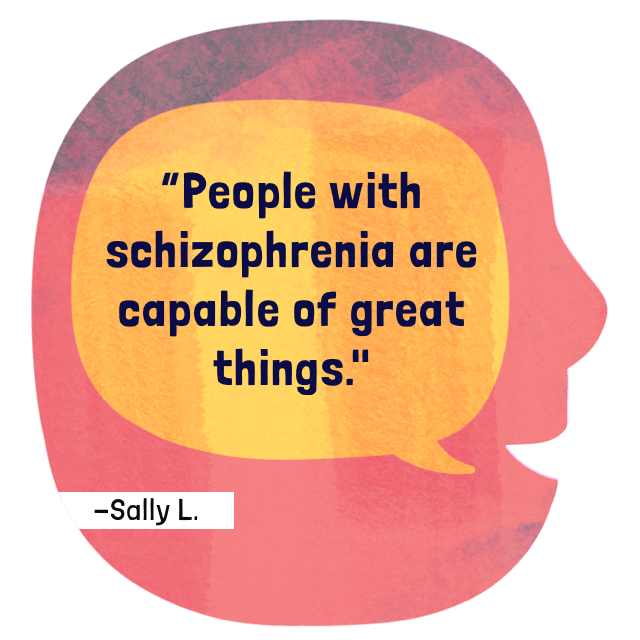4 Role Models Who Gave Me Hope After Schizophrenia
For me, one of the hardest parts of developing schizophrenia was the sense of isolation. Unlike some people with this condition, I had a close family member with schizophrenia. Even so, I felt alone in my experiences, like a freak of nature.
When I did hear about people with schizophrenia, it was always in a negative context. Our media has a devastating tendency to portray people like me as violent, dangerous, irredeemable leeches on society.
But can't you be a successful person with schizophrenia?
Perhaps this inaccurate yet pervasive stigma is why there are so few role models for those with schizophrenia. People who have managed to thrive despite schizophrenia don't have a lot of incentive to come forward about our diagnoses in a culture that shames and ostracizes us.
But there are plenty of people thriving with schizophrenia in the world today! Stigma just means we have to look a little harder to find them. And I can tell you from personal experience that when you finally do come across someone like you living a fulfilling, meaningful life, it can be game-changing.
Below, I've compiled a list of 4 role models who inspired me to persevere in my own recovery. Take a look at their stories. They just might inspire you, too.
4 amazing people living with schizophrenia
Lauren Kennedy
I started watching Kennedy's YouTube channel, "Living Well With Schizophrenia," a few months after it began in 2019. A therapist recommended the channel to me after I complained about how isolated I felt. Kennedy's channel ended up being the perfect remedy.
For the first time, I saw a fashionable, articulate young woman just a few years older than me who also had schizoaffective disorder, bipolar type. Despite her diagnosis, she managed to achieve a fulfilling life complete with a cute boyfriend.
She still struggled. Kennedy has been open about her on-and-off need to be on disability benefits. But one of the most important things I've learned from Kennedy is that one's worth isn't dependent on the extent of one's symptoms.
Esmé Wang
Esmé Wang was the second big name in schizophrenia advocacy I ever came across. Despite the success of Wang's debut novel, Wang's agent passed 3 times on her offer of an essay collection about her experience with schizoaffective disorder.
Nevertheless, Wang submitted The Collected Schizophrenias to Graywolf Press, who not only published it but also awarded it the Graywolf Press Nonfiction Prize. The Collected Schizophrenias later became a New York Times bestseller.
As an aspiring creative nonfiction writer myself, I learned from Wang not only that people with schizophrenia can write beautifully in my chosen genre, but that there is a market for our experiences. On a personal level, Wang put words to misunderstood truths I'd felt deeply for a long time, but didn't know how to express. The ending of her book's 5th essay continues to haunt me in the most powerful, human, clarifying way.

John Nash
If there is a single piece of media that most informs America's understanding of schizophrenia, it may likely be the movie A Beautiful Mind. It was for this reason – and not because I was all that interested in the film – that I sat down to watch it one night early in my advocacy career.
Unfortunately, I promptly fell asleep. I didn't have better luck when I tried listening to the A Beautiful Mind audiobook. I got bored and eventually went back to just listening to Lana Del Rey at the gym.
But even if you're not a fan of A Beautiful Mind, mathematician John Nash will likely still inspire you. A lot of people gave up on him after his onset. But he managed a full recovery and went on to win a Nobel Prize in economics in 1994.
What I admire most about Nash is his self-acceptance around his diagnosis. He once said, "I wouldn't have had good scientific ideas if I had thought more normally."
Elyn Saks
Though I never made it through either iteration of A Beautiful Mind, I did manage to get through Elyn Saks' memoir The Center Cannot Hold. The book is about her journey with schizophrenia through studying at Yale and Oxford before becoming dean of the Gould School of Law at the University of Southern California.
Saks' academic research and writing fearlessly champions the preservation of the dignity and rights of psychiatric patients. I first heard her experience of illegal, painful, and traumatic use of restraints in a psychiatric ward when she was a law student at Yale through her TED Talk on YouTube. It was the first time I saw someone in such an esteemed position argue that people like me need to be treated better in the healthcare system.
Saks inspired me to be public about my own experience with restraints and involuntary hospitalization and medication. In the process, I've healed some of my shame and become more comfortable in my own brain. I also was able to help others with similar experiences feel less alone.
Success and fulfillment while living with schizophrenia
My intent in sharing these stories is not to communicate that you need to win a Nobel Prize in economics or write a New York Times bestselling book to be worthy. Rather, it's to show you you are not alone in your experiences.
People with schizophrenia are capable of great things. If you decide to pursue your dreams while living with schizophrenia, you're in good company.
